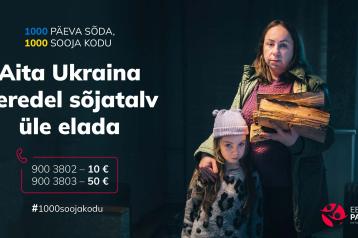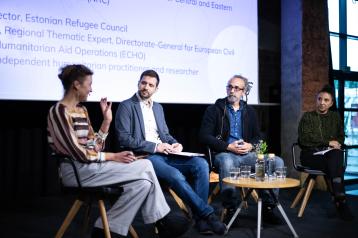Countries
16.11.2023
The conference of ERC held in Tallinn last week, on November 9, brought together humanitarian assistance experts from around the world to discuss how to provide aid as effectively as possible in a changing world using digital solutions, cash-based aid and local empowerment.
Eero Janson, head of the Estonian Refugee Council, said in his opening remarks that if 25 years ago Estonia was still in the role of a recipient of humanitarian aid, now it can quickly and effectively contribute to helping others. "Digitalization and artificial intelligence, cash-based aid and empowerment of people on the ground, smart use of data - these are some of the trends that give hope for even better and more effective assistance delivery."
The keynote address of the conference was given by Juliet Parker, head of the United Kingdom-based organization ALNAP, who emphasized the importance of ensuring long-term and consistent aid in crisis areas. "As crises drag on for a long time, victims seek help over a longer period of time, not just one-off short aid packages," emphasized Parker.
Mariin Ratnik, Deputy Chancellor for Foreign Economy and Development Cooperation of the Ministry of Foreign Affairs of Estonia, said in her opening speech that the world's need for humanitarian aid is increasing, both due to armed conflicts and climate change. "Crisis response funding is not keeping pace with needs and cannot be expected to keep pace. The humanitarian aid system is underfunded and overburdened. We have to do things differently.”
- In the first panel of the conference, led by Kitty Paulus (Norway Pagulasabi), Eero Janson (Estonian Pagulasabi), Quentin Le Gallo (ECHO) and Louisa Seferis (independent humanitarian aid consultant) discussed the pros, cons and future trends of cash-based aid. The panel can be watched on ERC's YouTube channel.
- In the second panel, led by Karin Maasel (Data Friendly Space), Luke Caley (IFRC), Javier Teran (OCHA) and Zineb Bhaby (Norway Pagulasabi) discussed the digitization of humanitarian aid and the use of data. The panel can be watched on ERC's YouTube channel.
- The third panel, under the leadership of Helen Kajulätte (Estonian Ministry of Foreign Affairs), focused on localization, i.e. increasing the ability to provide local aid to crisis centers using the example of Ukraine. Roksolana Nesterenko (Centre for United Action, Ukraine), Oleg Masyk (Swiss Embassy in Ukraine) and Pit Köhler (Federal Foreign Office of Germany) participated in the panel. The panel can be watched on ERC's YouTube channel.
- Eero Janson's speech
- Mariin Ratnik's speech
- Juliet Parker's speech
Conference images: https://drive.google.com/drive/folders/1uSy0HeUOa3GlkV225gCgqlGsLSMrVMJ7
Photographer: Anastasiia Lysenko
The organization of the conference was supported by the Estonian Center for International Development Cooperation.

Estonian Refugee Council is a public interest non-profit organization founded in 2000, whose goal is to stand up for the rights and well-being of refugees in Estonia and abroad. ERC is a humanitarian aid organization certified by the European Union.







